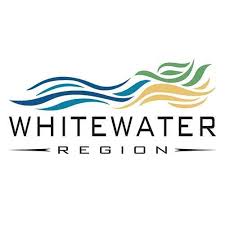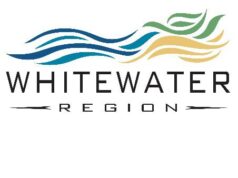WHITEWATER REGION (Cobden) — The Township of Whitewater Region held a special meeting of Council yesterday afternoon. In attendance at the municipal building was Mayor Mike Moore and Clerk Carmen Miller. The rest of Council was present via teleconference.
Moved by Councillor Mackay and seconded by Councillor Charlene Jackson, by-law 20-03-1278 was passed by unanimous vote. Electronic set up for the meetings during an emergency will now be implemented.
Robert Tremblay, Chief Administrative Officer, stated the 2019 Novel Coronavirus (COVID-19) pandemic has the potential to disrupt the meetings of Council, as members of Council may find themselves in self-isolation or quarantine for a variety of reasons. Those members who may wish to participate in meetings would be unable to do so. In addition, the municipal building is closed to the public.
Moved by Councillor Daryl McLaughlin and seconded by Councillor Dave Mackay, the Chief Administrative Officer (CAO) Robert Tremblay gave the verbal update after a unanimous vote was made to receive the update for information purposes.
“We’re dealing with a provincial State of Emergency,” he began. Continuity of services was the main point spoken about, as most municipal buildings have closed. People are welcome to phone the Township, as business will continue as usual this way. He reminded the requirements for health, safety and customer service must continue to be met. Casual part-time staff, such as at the landfill and crossing guards, have been laid off and will be called back when required.
Reeve Cathy Regier wanted to know who was involved in the ECG. Mr. Tremblay detailed, “Mayor Moore, Reeve Regier, as well as myself our CAO, our senior management team including representation from each of the departments, as well as our Community Emergency Management Coordinator (CEMC) Lee Cleroux manager of Public Works, and meetings are chaired by Carmen Millar, the alternative manager of Public Works.”
Councillor McLaughlin asked about the public works department and how the rotation for shifts was working. Mr. Tremblay detailed across Renfrew County, they have adopted a one week on, one week off schedule.
Councillor Chris Olmstead asked if the Township was in contact with the Renfrew County District Health Unit (RCDHU) on a regular basis. “Absolutely,” said Mr. Tremblay. “The CEMC’s are having teleconferences … and the CAO’s are as well … to provide a detailed update as to what’s going on … so we can keep our employees safe.”
Moved by Reeve Regier and seconded by Councillor McLaughlin, by-law 20-03-1279 was passed by unanimous vote. The by-law will provide some relief from interest, penalty and extend early bird dog tag rates due to the COVID-19 pandemic.
Treasurer Sean Crozier said penalties and interest are added on the first business day of the month for property taxes, utilities and accounts receivable, which are past due at a rate of 1.25 per cent. The CAO clarified they are not pushing back deadlines, but are instead not charging interest.
On February 6, interim tax bills were mailed out with instalments due February 28 and April 30. On March 5, utility bills were mailed out for the period of January 1 to February 29, that are due March 31, 2020. Account Receivable invoices are mailed out monthly with the amount due at the end of the month. Dog license fees are set to increase on April 1.
A 0 per cent interest and penalty rate for March and April of this year was recommended. In addition, the early bird rate for dog tags would be extended to May 31. It is estimated the revenue foregone would be around $32,000. The financial implications on moving the early bird dog licence date is said to be minimal. The 2020 budget has revenue budgeted as follows: interest and penalty on tax arrears budgeted $200,000; interest and penalty on utility arrears budgeted $15,000; late payment fees on accounts receivable budgeted $3,000; and dog tag sales budgeted $13,000.
Moved by Councillor Mackay and seconded by Councillor Jackson, by-law 20-03-1080 was passed by unanimous vote. The by-law is to establish a “Delegated Authority Policy”. The CAO stated this policy authorizes a municipality to delegate its powers and duties under the Municipal Act, 2001, or any other act, to a person or body subject to the restrictions set out in the Act. Section 270(1) “requires a municipality to adopt and maintain policies with respect to the delegation of its powers and duties”. The Township did not previously have this mandated policy.
According to a document from the Township, “the policy proposed yesterday provides for the delegation of certain powers and duties with reporting to Council on actions and decisions. A delegation can be altered or removed at any time. Delegation of authority allows for certain matters, generally routine and administrative in nature, to be dealt with in a timely fashion. Provisions include the Lame Duck period during an election year, as well as actions by the Municipal Emergency Control Group during a declared emergency. Reporting out will occur in the Administration Report for quarterly and annual items.”
Moved by Reeve Regier and seconded by Councillor Olmstead, by-law 20-03-1281 was passed by unanimous vote. The by-law is to establish an “Alternative Working Arrangement Policy”. The CAO explained during the current pandemic, some staff will be required to work in alternate locations or schedules to continue essential services and stay safe in keeping with orders of the health unit, Province and Federal Government.
“We are hopeful that this will help,” said Tremblay. This policy was brought forward to provide guidelines for approvals. The Township noted, “alternative working arrangement may be required from time to time, wherever it is possible and practical to do so, without compromising either the efficiency and effectiveness of the Township or overall service delivery.”
“It is not possible to offer alternate working arrangements to all staff as the requirements of some positions will not be suitable for such arrangements,” stated documents provided by the Township. “The policy covers the following types of alternative working arrangements: telecommuting, flex time, and reduced hours. The policy sets outs requirements for supervisors and employees. It also provides checklists to determine suitability and occupational health and safety compliance.”
The positions confirmed suitable for alternative working arrangements during the current pandemic are in the process of being determined.
Editor’s Note: The Township of Whitewater Region’s municipal buildings are closed to the public due to the COVID-19 pandemic. Whitewater News attended the special meeting of Council via livestream on their YouTube channel.






![Kenopic/Smith Auction [Paid Ad]](https://whitewaternews.ca/wp-content/uploads/2018/10/advertising-100x75.jpeg)

